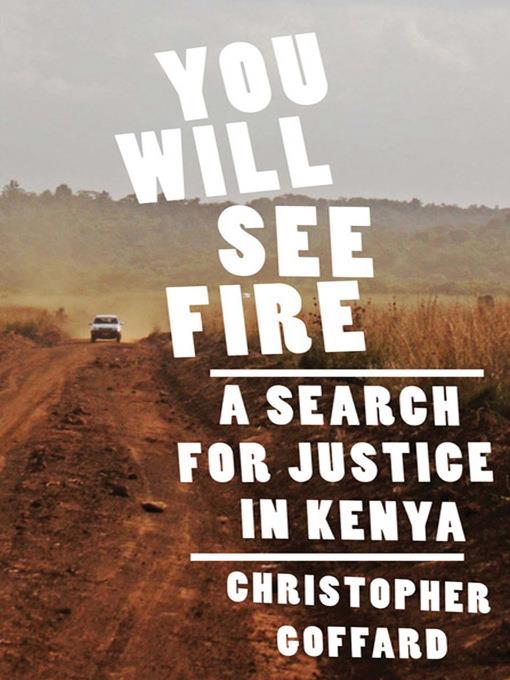
You Will See Fire
A Search for Justice in Kenya
کتاب های مرتبط
- اطلاعات
- نقد و بررسی
- دیدگاه کاربران
نقد و بررسی

September 26, 2011
With the support of extensive government documents, interviews, and candid photos, Goffard, a writer for the Los Angeles Times, examines the life and death of a true Roman Catholic warrior priest, Father John Kaiser, an advocate of the poor and abused Kenyans in the bush. Collecting facts of the brutality of the tyrant Daniel Arap Moi’s henchmen in journals and affidavits, Kaiser, a missionary labeled uncontrollable by his church superiors, boldly confronted the ruthless rule of a local strongman on his own turf and testified before a commission to expose the atrocities against the townspeople. Goffard’s eye for detail and political complexity lends authenticity to the rebel priest’s long commitment to the Kenyans, fighting for justice and stability since his early days in the country in the 1960s, and leading to his execution style slaying on a dirt road in 2000. After an FBI investigation concluded Kaiser had committed suicide (with a bullet shot to the back of his head), the author uncovers a later ruling based on evidence neglected in the earlier hearing. Startling revelations, government miscues, and one brave man’s crusade to seek the truth make this political mystery exceptional and informative reading. 8 pages of
photos.

October 1, 2011
A journalist revisits the unsolved mystery surrounding the 2000 death of a controversial Catholic priest. Los Angeles Times contributor Goffard (Snitch Jacket, 2007) probes beneath the headlines in this nuanced, multilayered account of the life of Father John Kaiser, an American former paratrooper who joined a Catholic missionary order and served in Kenya for more than three decades. During his life, he was considered something of a crank--he always carried a shotgun and hunted big game and was conservative on matters of Catholic doctrine yet appreciated the role played by native witch doctors--but he was admired for his courageous stand against the corrupt Kenyan dictator Daniel Aratrap Moi. Goffard believes that Kaiser, who before his death became "a symbol of national conscience, a source of hope, a galvanizing force," was murdered because of his campaign to bring one of Moi's top henchman to trial and bring the dictator himself before the Hague Court of International Justice. Kaiser did not have the support of his Catholic superiors, who feared reprisals against the church. While the case for murder is certainly plausible, the author also considers the possibility of suicide because of Kaiser's fear that he would be forced to return to the United States. Plagued by malaria and other ailments, including several bipolar episodes, the 67-year-old priest almost appeared to be courting martyrdom. That he staged his suicide to look like murder is also possible, although his Catholic beliefs speak against this possibility. In 2002, the Moi regime was finally overthrown. Goffard makes a convincing case that although the circumstances of Kaiser's death remain a mystery, his legacy is incontestable.
(COPYRIGHT (2011) KIRKUS REVIEWS/NIELSEN BUSINESS MEDIA, INC. ALL RIGHTS RESERVED.)

July 1, 2011
In August 2000, three weeks before he was to testify against the repressive regime of President Daniel Arap Moi before the International Criminal Court in the Hague, Father John Kaiser was found shot to death on a lonely road in Kenya. The FBI ruled it a suicide, despite Father John's unending courage in standing up for the poor. Los Angeles Times writer Goffard re-creates the life and death of an exceptional man.
Copyright 2011 Library Journal, LLC Used with permission.

Starred review from December 1, 2011
Father John Kaiser, a Minnesotan who chose Kenya as his parish, was killed in 2000 after years of threats from strongmen for Kenyan leader Daniel Aratrap Moi that the priest's challenges to tyranny would not be tolerated. Journalist Goffard treats Kaiser's murder as a mystery, slowly unveiling the mounting tensions between the priest and Moi as Kaiser stood up against rapes, intimidation, and other violence against villagers. Kaiser, in his sixties, physically lent his muscle to building a new church and often hunted warthogs and other game, challenging the image of a passive clergyman. He was an irritant to the church authorities, who had ordered him to move on from Kenya shortly before his death; but he had allies in the remote villages and in Charles Gathenji, a Kenyan attorney whose father had been killed in a politically charged slaying. Aware of the danger he was in, the priest was in the habit of keeping a shotgun nearby at all times. Despite an FBI investigation that ruled Kaiser's death a suicide, Goffard doggedly launched an investigation and offers a thrilling chronicle of one man's effort to challenge injustice in Kenya and the price he paid.(Reprinted with permission of Booklist, copyright 2011, American Library Association.)

























دیدگاه کاربران